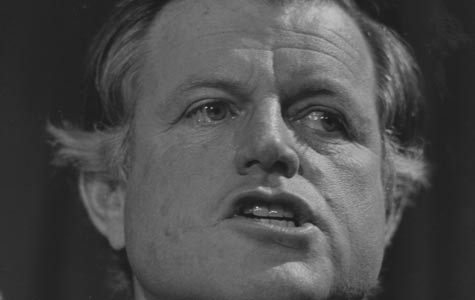
Photo: Richard M. Feldman, 1980 |
This article was originally published in the Capital Letters of the December 11, 1979 Boston Phoenix
Washington – Edward M. Kennedy's presidential campaign has a serious problem, and the problem appears to be Edward M. Kennedy. During the week in which leadership was transformed from a word in the lexicon of his campaign rhetoric to a measurable reality, Kennedy succeeded in verbally vanishing himself to a political isolation that had been, until his improvident remarks, solely the province of the Iranian government.

At the same time that every member of the UN Security Council – including representative of Czechoslovakia and the Soviet Union – could be seen on our TV screens raising his hand in support of a resolution condemning Iran's actions – a resolution condemning Iran's actions – a resolution that assiduously avoided any mention of the shah – Kennedy could also be viewed carelessly debasing the shah with a hyperbolic gusto equaled only by Jimmy Carter's foppish praise of Pahlevi a few months before he was overthrown. These images were swiftly followed by those of Iranian newspapers happily headlining Kennedy's condemnation of Pahlevi and head shots of the churlish Ghotbzadeh, gloating over Kennedy's goof. They were not images destined to make Kennedy the darling of patriotic citizens in America's hinterlands.
"If the Iranians aren't printing up posters with Khomeini and Kennedy standing side by side in the crowd outside the embassy," a Carter adviser chuckled facetiously, "hopefully somebody in the CIA will have the good sense to think of it."
Kennedy supporters, understandably, are finding much less to laugh about in his performance. "I think the Iranian thing is potentially fatal," says one of his ardent backers in Massachusetts, "one of the worst kind of political statements I've ever seen." The criticism emanating from Kennedyites on Capitol Hill is equally damning, though "disappointment" is the word they use most frequently. "If you're a Kennedy guy," explained one of Teddy's more loyal congressional allies, "you figure anything he says, you can excuse it. But you don't want to have to excuse something every day." An angered member of House leadership was more direct: "It literally dilutes our negotiating position by reinforcing Iran's negotiation position."
Kennedy's campaign staff concedes that the senator was not operating on advice from his tacticians; he was flying on automatic pilot. Predictably, staffers attempt to rationalize away the impact of his faux pas, insisting that "he's right on the merits; it's a close call on timing." The more enlightened view appeared to come from the beleaguered switchboard operator at Kennedy headquarters. Apparently moved more by hard realities than by far-fetched rationalizations, she confessed that incoming calls from the public are running overwhelmingly against Kennedy's remarks. That voters glean a grain of truth amid Kennedy's blast against the shah is both probable and inconsequential, since, as any number of national polls have revealed, the public seems to have an amazingly sophisticated understanding of the negotiating symbols involved in these circumstances.
Thus, as was the case with Watergate, the public appears to be ahead of politicians' perceptions – or at least of Ted Kennedy's perceptions in this situation. People understand that the question is not the shah himself, as Kennedy would have it, but the necessity of defending principles of international diplomacy.
Kennedy-campaign staffers also confide that Teddy has probably pushed himself too hard in this early campaign swing, in an attempt to make up ground on Carter. This has resulted, they claim, in a weary candidate given to poor performances. Some of this may be true; for, although Ted Kennedy is not as glib as his well-crafted speeches have suggested over the years, neither is he as inarticulate as his stump performances have shown him over the past several weeks. "He was always so well-prepared," a friendly Massachusetts congressman mused. "But now he doesn't seem the polished, astute guy he's been. He almost looks preoccupied."
Yet the problem with Kennedy's campaign is not simply a case of road fatigue or reoccurring foot-in-mouth disease; nor can it be laid off to the distracted mien of a man who must understandably fear maniacal intent lurking around every corner. The more profound problem posed by his performance – particularly by his comments on Iran – is that it reinforces public doubt about his judgment. The fundamental question raised is this: with other people's well-being at stake, does Kennedy put his personal and political interests ahead of those in danger? It is the Chappaquiddick question bridging several continents.
Nor can Ted Kennedy afford to speak with a forked tongue about our posture of national unity toward Iran's threats when the most damaging perception about him is that he covered up after the accident at Dike Bridge by deceiving the public – which just happens to be what 80 percent of the Democratic public believes he did, including 60 percent of his own supporters. As one of Kennedy's congressional advocates complained, "It looks like he's gonna have to ride that Dike Bridge until Election Day."